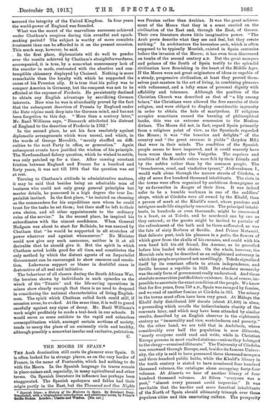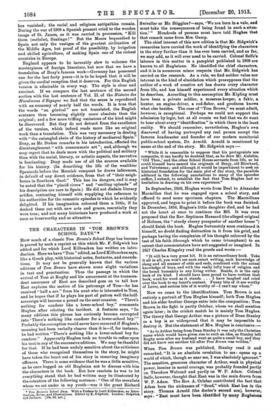THE MOORS IN SPAIN.*
THE Arab domination still casts its glamour over Spain. It is often looked for in strange places, as on the very border of France, in the name of Fontarabie, which had nothing to do with the Moors. In the Spanish language its traces remain in place-naines and, especially, in many agricultural and other terms. On Spanish literature its influence has perhaps been exaggerated. The Spanish apologues and fables had their
origin partly in the East, but the Thousand and One Nights
• - • • Spaitiab /dam; a Hiator5 of the Moslems is Spain. By Epinhart Dory. Translated, Nita a bibrisphical introduction and additional notes, by Francis %riga Stokes. London Ckatto and Wiailns, [21a, net.] was Persian rather than Arabian. It was the great achieve- ment of the Moors that they in a sense carried on the civilization of the East and, through the East, of Greece. Their own literature shows little imaginative power. " The Arab poets describe what they see and feel, but they create nothing." In architecture the horseshoe arch, which is often supposed to be typically Moorish, existed in Spain centuries before the invasion of the Moors; it has even been discovered on tombs of the second century A.D. But the great mosques and palaces of the South of Spain testify to the splendid civilization here flourishing in the heart of the Middle Ages. If the Moors were not great originators of ideas or capable of a steady, progressive civilization, at least they proved them- selves past-masters in the art of living, in combining pleasure with refinement, and a lofty sense of personal dignity with affability and tolerance. Although the position of the Christian Church was described as that of " a lily among briars," the Christians were allowed the free exercise of their religion, and were obliged to display considerable ingenuity in order to obtain the halo of martyrdom. If religious scruples sometimes caused the burning of philosophical books, this was an extreme concession to the Moslem divines. The Moors did not, in fact, regard Spain primarily from a- religious point of view, as the Spaniards regarded the Moors; it was "the beauties and delights" of the country and " the great revenue it yields " (Leyden MS.) that were in their minds. The condition of the Spanish people seems to have improved, and it could scarcely have been worse than under the Visigoths. The caprices and cruelties of the Moorish rulers were felt by their friends and by the nobles rather than by the common people. The "treacherous, cruel, and vindictive tyrant," Abderrahman I., would walk alone through the narrow streets of Cordoba, a city of some five hundred thousand inhabitants. The riots in the towns were often organized by ambitious demagogues or by ex-favourites in danger of their lives. It was indeed safer to be a humble workman in one of the saddlers' shops, which at Cordoba were all owned by the Khalif, than a person of mark at the Khalif's court, where passions and intrigues made life singularly uncertain. The principal inhabi- tants, in hundreds. or even thousands, might be summoned to a feast, as at Toledo, and be murdered one by one as they entered; or the guests might be invited to partake of the refreshment of the bath and be there suffocated, as was the fate of sixty Berbers at Seville. And Prince Mutamid, that delicate poet, took his pleasure in a patio, the flowers of which grew from the skulls of his enemies, and could with his own hand kill his old friend, Ibn Ammar, as be grovelled before him loaded with chains. On the whole, however, the Moorish rule may be described as an enlightened autocracy in which the people acquiesced not unwillingly. Toledo signalized itself by its constant efforts to attain independence, and Seville became a republic in 1023. But absolute monarchy was the only form of government really understood. And these absolute monarchies justified their existence. It is, of course, im- possible to ascertain the exact condition of the people. We know that for five years, from 750 A.D., Spain was ravaged by famine, and we read of another famine at Cordoba in 915. The misery in the towns must often have been very great. At Malaga the Khalif daily distributed 500 ducats (about £1,400) in alms, a proceeding which recalls the indiscriminate charity of the convents later, and which may have been attended by similar results, described by an English observer in the eighteenth century as "immorality and vice, wretchedness and poverty." On the other hand, we are told that in Andalucia, where considerably over half the population is now illiterate, "nearly everyone could read and write, while in Christian Europe persons in most exalted stations—unless they belonged to the clergy—remained illiterate." The University of COrdoba, was renowned through Europe, and, besides its famous Univer- sity, the city is said to have possessed three thousand mosques and three hundred public baths, while the Khalif's library in the tenth century is stated to have numbered four hundred thousand volumes, the catalogue alone occupying forty-four volumes. At Almeriia we hear of another library of four hundred thousand volumes. At Silver_ "-everyone was a poet," "almost every peasant could improvise." It was inevitable that the hardier- and more fanatical inhabitants of the North of Spain should ultimately triumph over these populous cities and this enervating culture. The prosperity has vanished ; the racial and religious antipathies remain. During the war of 1909 a Spanish peasant cried to the wooden image of St. James, as it was carried in procession, "Kill them (radtalos), Santiago !" But the Moors bequeathed to Spain not only the vestiges of the greatest civilization of the Middle Ages, but proof of the possibility, by irrigation and skilled agriculture, of making Spain one of the richest countries in Europe. England appears to be incurably slow to welcome the masterpieces of foreign literature, but now that we have a translation of Dozy's famous work—Germany has possessed one for the last forty years—it is to be hoped that it will be given the cordial reception that it deserves. For this English version is admirable in every way. The style is clear and succinct. If we compare the last sentence of the second section with the lust sentence of Vol. II. of the Histoire des Nusulmans d'Espagne we find that the sense is reproduced with an economy of nearly half the words. It is true that the words "en general" are not translated, the English sentence thus becoming slightly more absolute than the original ; and a few more trifling omissions of the kind might be discovered. But they do not detract from the excellence of the version, which indeed reads more like an original work than a translation. This was very necessary in dealing with " the entangled skein of the history of mediaeval Spain." Dozy, as Mr. Stokes remarks in his introduction, effected the disentanglement " with consummate art "; and, although we may regret that he deals more with the political and military than with the social, literary, or artistic aspects, the narrative is fascinating. Dozy made use of all the sources available for his history. (In describing the life of the wealthier Spaniards before the Moorish conquest be draws inferences, in default of any direct evidence, from that of "their neigh- bours in Southern Gaul." This has its dangers, and it may be noted that the "placid rivers" and "smiling uplands" of his description are rare in Spain.) He did not disdain literary artifice, contenting himself with supplying the reference to his authorities for the romantic episodes in which he evidently delighted. If his imagination coloured them a little, if he decked them out with new arts and graces, essentially they were true ; and not many historians have produced a work at once so trustworthy and so attractive.











































 Previous page
Previous page